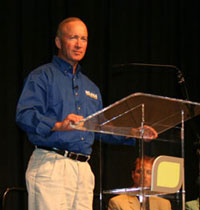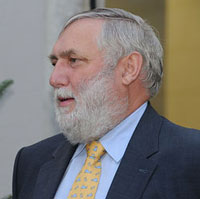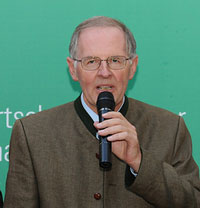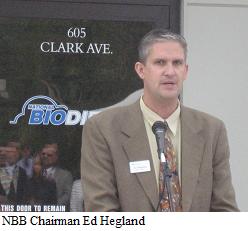 Ethanol-powered planes flew in formation in the blue Hoosier sky Thursday to mark the opening of Indiana’s newest ethanol plant in North Manchester.
Ethanol-powered planes flew in formation in the blue Hoosier sky Thursday to mark the opening of Indiana’s newest ethanol plant in North Manchester.
POET hosted a grand opening event for POET Biorefining – North Manchester, the company’s 24th production facility and the third in Indiana.
 “With its third Indiana facility, POET is quickly becoming a household name in our small towns,” said Indiana Governor Mitch Daniels. “This new North Manchester facility means more good jobs and an important market for our Hoosier farmers.”
“With its third Indiana facility, POET is quickly becoming a household name in our small towns,” said Indiana Governor Mitch Daniels. “This new North Manchester facility means more good jobs and an important market for our Hoosier farmers.”
Jeff Broin, CEO of POET, said. “The ethanol that will be produced in this facility will displace over 60 million gallons of fossil fuels annually – decreasing our dependence on foreign oil and saving consumers money at the pump.”
POET Biorefining – North Manchester will utilize 22 million bushels of corn from the area to produce 65 million gallons of ethanol and 178,000 tons of Dakota Gold Enhanced Nutrition Distillers Products™ per year.


 The group of 250
The group of 250  The president of the Austrian Chamber of Forestry and Agriculture Gerhard Wlodkowski commented on the issue during his welcome address to the journalists. He noted that consumers in Austria are complaining about the increase in food prices, but they “don’t consider that in the year 1970 in Austria everybody spent 33 percent of their income for food and today they spend only 13 percent of their income.”
The president of the Austrian Chamber of Forestry and Agriculture Gerhard Wlodkowski commented on the issue during his welcome address to the journalists. He noted that consumers in Austria are complaining about the increase in food prices, but they “don’t consider that in the year 1970 in Austria everybody spent 33 percent of their income for food and today they spend only 13 percent of their income.”  “We have clearly seen a positive impact since the biodiesel tax incentive was enacted as part of the American Jobs Creation Act of 2004,” Feraci stated. “Not only has there been an increase in jobs, biodiesel has proven to be a viable energy alternative which is environmentally friendly. Continuing this incentive will take the nation one large step closer to energy independence,” Feraci continued.
“We have clearly seen a positive impact since the biodiesel tax incentive was enacted as part of the American Jobs Creation Act of 2004,” Feraci stated. “Not only has there been an increase in jobs, biodiesel has proven to be a viable energy alternative which is environmentally friendly. Continuing this incentive will take the nation one large step closer to energy independence,” Feraci continued. Earlier this week at the new, green NBB building grand opening ceremony in Jefferson City, Mo., Missouri Congressman Kenny Hulshof made the case why the biodiesel industries needs the incentives. He explained that it’s the only way to level the playing field with the petroleum industry that has been the benefactor of tax breaks for decades… even as it enjoyed record profits.
Earlier this week at the new, green NBB building grand opening ceremony in Jefferson City, Mo., Missouri Congressman Kenny Hulshof made the case why the biodiesel industries needs the incentives. He explained that it’s the only way to level the playing field with the petroleum industry that has been the benefactor of tax breaks for decades… even as it enjoyed record profits. A handful of students at Washington State University are trying to take their energy future into their own hands. While the WSU Biodiesel Club only got about 10 members at their first meeting this week, organizers hope that the student-run operation soon will be producing 200 gallons of the green fuel a day.
A handful of students at Washington State University are trying to take their energy future into their own hands. While the WSU Biodiesel Club only got about 10 members at their first meeting this week, organizers hope that the student-run operation soon will be producing 200 gallons of the green fuel a day.  During this week’s ribbon-cutting ceremony at the new National Biodiesel Board building in Jefferson City, those in attendance included local and state officials and nine members of the Board from around the country.
During this week’s ribbon-cutting ceremony at the new National Biodiesel Board building in Jefferson City, those in attendance included local and state officials and nine members of the Board from around the country.
 Oklahoma might be famously known for its “winds that come sweepin’ down the plains,” and one of the leading universities in the state is going to put that to work.
Oklahoma might be famously known for its “winds that come sweepin’ down the plains,” and one of the leading universities in the state is going to put that to work. “It is our patriotic duty as Americans to help our country achieve energy independence,” Boren said at a news conference at OU. “We should become a national role model for the environment.”
“It is our patriotic duty as Americans to help our country achieve energy independence,” Boren said at a news conference at OU. “We should become a national role model for the environment.”
 This week, Belgian professor and so-called United Nations “expert” Olivier de Schutter tried to blame the rise in food prices on biofuels. But Jobe fought back with the best weapon available:
This week, Belgian professor and so-called United Nations “expert” Olivier de Schutter tried to blame the rise in food prices on biofuels. But Jobe fought back with the best weapon available:  While the soaring price of oil is overwhelmingly recognized as the major factor driving food price increases, biofuels such as ethanol and biodiesel have had a marginal effect on the increase in food prices in the U.S. – about four to five percent – according to the U.S. Department of Energy and the USDA.
While the soaring price of oil is overwhelmingly recognized as the major factor driving food price increases, biofuels such as ethanol and biodiesel have had a marginal effect on the increase in food prices in the U.S. – about four to five percent – according to the U.S. Department of Energy and the USDA. Jenna Higgins Rose, the friendly communications director at NBB, gave me the “nickel tour” (although it didn’t cost a dime!) of their new digs. That’s Jenna on the right, showing me the new conference room with a state-of the art video conferencing system with the NBB’s office in Washington, DC (that’s a picture of the DC office on the screen). This is just one example of how the good folks at NBB are really practicing what they preach. Doing a conference over a video conference saves them not only thousands of dollars and many hours of travel time, but they greatly reduce their carbon footprint by not burning the fuel needed to fly to the various locations that this truly national organization covers.
Jenna Higgins Rose, the friendly communications director at NBB, gave me the “nickel tour” (although it didn’t cost a dime!) of their new digs. That’s Jenna on the right, showing me the new conference room with a state-of the art video conferencing system with the NBB’s office in Washington, DC (that’s a picture of the DC office on the screen). This is just one example of how the good folks at NBB are really practicing what they preach. Doing a conference over a video conference saves them not only thousands of dollars and many hours of travel time, but they greatly reduce their carbon footprint by not burning the fuel needed to fly to the various locations that this truly national organization covers.